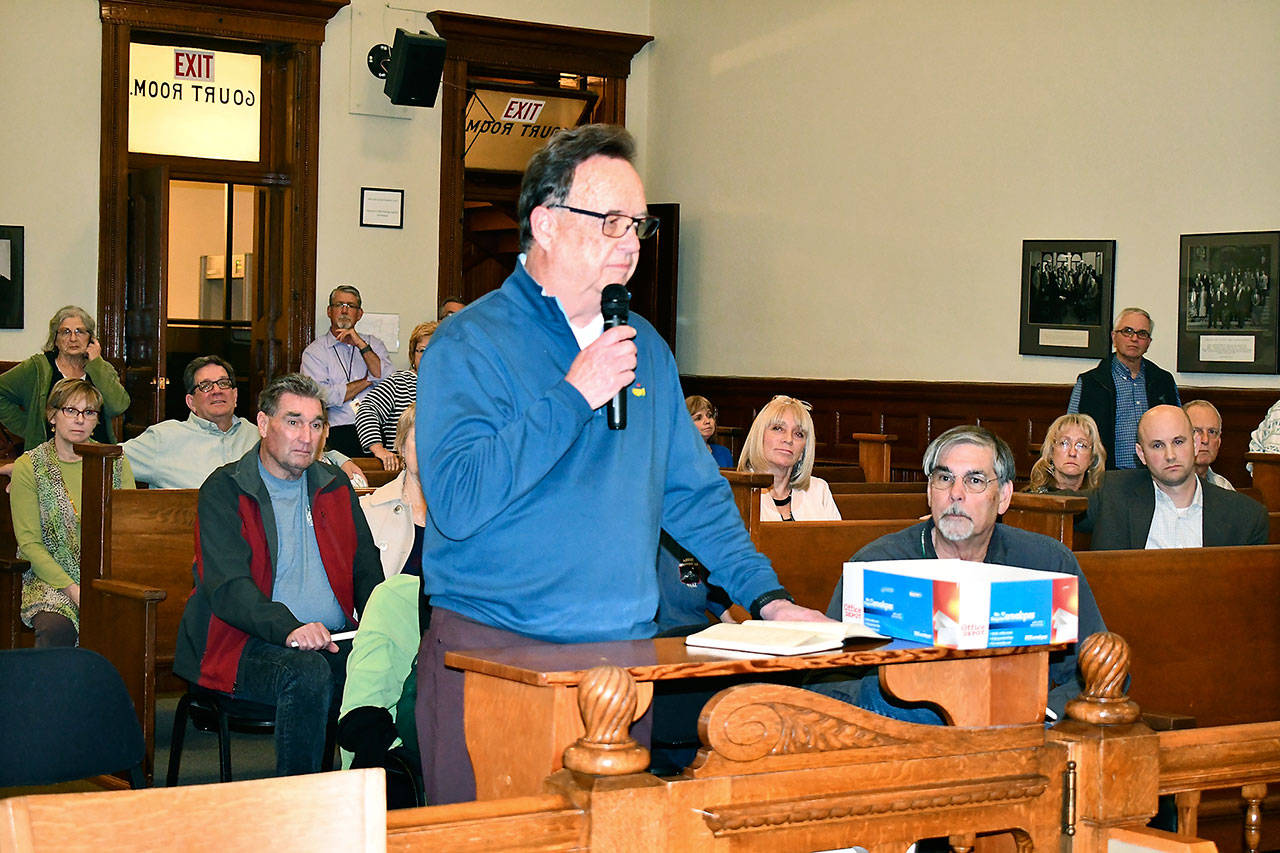PORT TOWNSEND — Jefferson County commissioners heard an earful at a public hearing on the proposed 265-acre Pleasant Harbor Master Planned Resort development agreement.
Close to 70 residents of Brinnon, Quilcene, Port Ludlow and Port Townsend, along with area tribal members, voiced their opinions to the Jefferson County Board of County Commissioners during a meeting Monday night in the Superior Court courtroom that lasted more than 3½ hours, with about 120 people in attendance.
No action was taken on the controversial project proposed for the Black Point Peninsula 2 miles south of Brinnon that has been under consideration for a decade.
Written comments will be accepted through Friday. They should be directed to the Board of County Commissioners at P.O. Box 1220, Port Townsend, WA 98368 or by email at jeffbocc@co.jefferson.wa.us.
To see the proposed ordinance and the development agreement, go to https://tinyurl.com/PDN-Pleasantharbordevelopment.
Testimony and remarks will be reviewed by staff throughout the next few weeks.
In 2008, commissioners approved an ordinance with 30 conditions that developers must meet. Much of the development agreement addresses how the resort will meet those requirements.
In addition to the development agreement, commissioners will consider amending Title 17 and Title 18 to adopt zoning and other development regulations.
“We are at the stage where we are looking at development regulations,” said David Sullivan, chairman and District 2 commissioner. “There are things that must be passed before we go on further. The permit follows later.”
Commissioners Kate Dean (District 1) and Kathleen Kler (District 3) also were present, along with County Administrator Philip Morley.
President and CEO Garth Mann of Statesman Group, developer of the Pleasant Harbor MPR, was the last speaker to address the commissioners.
“I think this is the 25th or 27th public hearing on the subject and it’s been democracy at its finest,” Mann said. “We’ve learned a lot. We’ve bent over backwards to please the tribes, we’ve bent over backwards to please the environmentalists, and we take great pride in being environmentalists ourselves.
Mann said he asked that the tribes help his company “monitor why there’s pollution at the Duckabush delta every year when the floods come and the spring thaw happens. It’s something that we can work on together, investigate and find a cure to this problem.
“We want to bring money into the valley, and right now it’s suffering,” he continued. “We want to work with everyone involved so we can improve the economy.”
Of those residents who testified, 46 spoke in favor of Pleasant Harbor and 19 were opposed. Some comments included:
Jim Watson of Brinnon: “Port Townsend is a mill town. I think Brinnon can be a resort town. It’s taken awhile for me to get there.”
Rob Mitchell of Brinnon: “There’s no mitigation for traffic, with 2,000 people added to the roads. Eighty-seven percent of the jobs are seasonal and low wage. It’s a horrible idea.”
Scott Hogenson of Port Ludlow supported the proposal as written and said sales and real estate taxes could be used for affordable housing and improved social services.
Gretchen Brewer of Port Townsend said she has serious reservations and stressed that commissioners “listen to the people speaking about the environment and specialness of this area.”
She said the kettles are the “heartbeat” of the area.
The area has three kettles — shallow, sediment-filled bodies of water formed by retreating glaciers or draining floodwaters. In addition to being unique geological sites, these are also considered to be sacred sites by the S’Klallam Tribe.
According to the proposed agreement, if the State Advisory Council on Historic Preservation determines that the kettles are eligible to be listed on the National Register of Historic Places, the area would be preserved and enhanced by native vegetation and educational signage. If not recognized, the area could be used for stormwater storage.
Bud Schindler of Brinnon who lives about 1,000 yards from the proposed site, said he has never seen an elk on Black Point.
“All environmental concerns have been addressed again, and for the past 11 years,” he said. “I’m happy with the proposal and support development of this project.”
Steve Hammond of Port Ludlow pointed out that Leavenworth and Coeur d’Alene became successful resort towns because “leaders found ways to grow and were not deterred. No guts, no glory.”
Laura Price of the Port Gamble Tribe said the decisions made must benefit the next generations.
“The Hood Canal is an important ecosystem, with clean water, salmon runs and elk,” she said. “Let’s think about our future.”
Director of Community Development Patty Charnas provided a historical review of action concerning the project since 2008.
• County ordinance approves the development if built with certain conditions. The parcel formerly zoned rural residential is next to a 300-slip marina that was redeveloped under an existing site plan.
The proposed resort includes a nine-hole golf course, with a three-hole practice course, 890 residential units consisting of guest rental and worker housing, 56,608 square feet of commercial space with resort related amenities, and 103 acres of preserved natural area.
• During 2008 through 2015, a supplemental environmental impact statement (EIS) analyzed and published a final resort plan with code amendments and a development agreement.
The agreement also requires the developer to address the project’s impact on water quality and water monitoring.
Developers have 25 years to build out the project from the effective date of adoption of the final agreement, or five years after the completion of all phases as described in the plan.
________
Jefferson County Editor/Reporter Jeannie McMacken can be reached at 360-385-2335 or at jmcmacken@peninsuladailynews.com.

